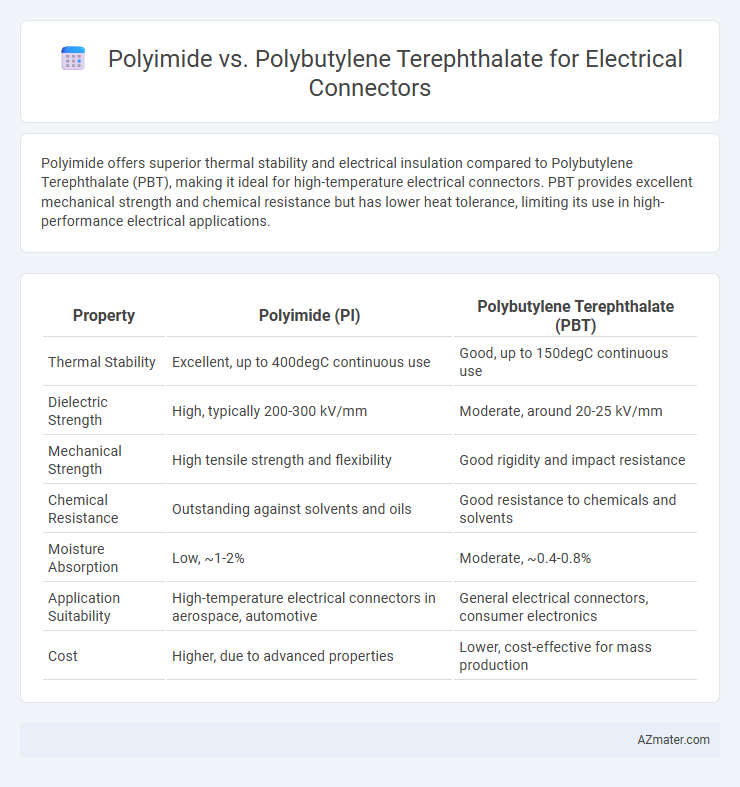Polyimide offers superior thermal stability and electrical insulation compared to Polybutylene Terephthalate (PBT), making it ideal for high-temperature electrical connectors. PBT provides excellent mechanical strength and chemical resistance but has lower heat tolerance, limiting its use in high-performance electrical applications.
Table of Comparison
| Property | Polyimide (PI) | Polybutylene Terephthalate (PBT) |
|---|---|---|
| Thermal Stability | Excellent, up to 400degC continuous use | Good, up to 150degC continuous use |
| Dielectric Strength | High, typically 200-300 kV/mm | Moderate, around 20-25 kV/mm |
| Mechanical Strength | High tensile strength and flexibility | Good rigidity and impact resistance |
| Chemical Resistance | Outstanding against solvents and oils | Good resistance to chemicals and solvents |
| Moisture Absorption | Low, ~1-2% | Moderate, ~0.4-0.8% |
| Application Suitability | High-temperature electrical connectors in aerospace, automotive | General electrical connectors, consumer electronics |
| Cost | Higher, due to advanced properties | Lower, cost-effective for mass production |
Introduction to Electrical Connector Materials
Polyimide and Polybutylene Terephthalate (PBT) are widely utilized materials in electrical connector manufacturing due to their distinct thermal and mechanical properties. Polyimide offers exceptional heat resistance up to 400degC and excellent dielectric strength, making it ideal for high-temperature and high-performance connector applications. PBT provides good dimensional stability, chemical resistance, and electrical insulation, suitable for cost-effective connectors operating under moderate temperature conditions up to 150degC.
Overview of Polyimide (PI)
Polyimide (PI) is a high-performance polymer renowned for its exceptional thermal stability, electrical insulation properties, and chemical resistance, making it ideal for electrical connector applications that demand reliability under extreme conditions. Its ability to withstand continuous operating temperatures up to 400degC and maintain dielectric strength above 300 kV/mm positions PI as a preferred material for connectors in aerospace, automotive, and electronics industries. Compared to Polybutylene Terephthalate (PBT), polyimide offers superior mechanical strength and dimensional stability, ensuring long-term performance in high-temperature environments.
Key Properties of Polyimide
Polyimide exhibits exceptional thermal stability, maintaining performance at temperatures exceeding 250degC, making it ideal for electrical connectors exposed to high heat. Its superior dielectric strength and low moisture absorption ensure reliable insulation and long-term electrical integrity. Additionally, polyimide's mechanical robustness and chemical resistance contribute to enhanced durability in demanding electronic environments compared to polybutylene terephthalate.
Overview of Polybutylene Terephthalate (PBT)
Polybutylene Terephthalate (PBT) is a thermoplastic polyester known for excellent electrical insulation properties, high mechanical strength, and resistance to heat and chemicals, making it a popular choice for electrical connectors. Its dimensional stability and resistance to moisture enhance connector performance in harsh environments compared to Polyimide, which offers superior thermal resistance but at a higher cost. PBT's ease of molding and cost-effectiveness make it suitable for mass production of electrical connectors requiring reliable dielectric strength and mechanical durability.
Key Properties of Polybutylene Terephthalate
Polybutylene Terephthalate (PBT) offers excellent electrical insulation, high mechanical strength, and superior resistance to solvents and abrasion, making it ideal for electrical connector housings. Its low moisture absorption and stable dielectric properties ensure reliable performance in humid environments. PBT also exhibits good thermal stability with continuous use temperatures up to 130degC, providing durability in demanding electrical applications compared to polyimide.
Mechanical Performance: Polyimide vs PBT
Polyimide offers superior mechanical performance compared to Polybutylene Terephthalate (PBT) in electrical connectors, exhibiting exceptional tensile strength and high resistance to deformation under stress. Its outstanding thermal stability enhances durability in high-temperature environments, maintaining mechanical integrity where PBT may soften or lose rigidity. While PBT provides good impact resistance and flexibility, polyimide's higher modulus and creep resistance make it ideal for demanding electrical connector applications requiring long-term mechanical reliability.
Thermal Stability and Heat Resistance Comparison
Polyimide exhibits superior thermal stability with continuous use temperatures up to 260degC, making it ideal for high-temperature electrical connectors requiring prolonged heat exposure resistance. Polybutylene terephthalate (PBT) generally withstands temperatures up to 120degC before deformation, limiting its application in extreme thermal environments. The higher glass transition temperature and excellent dimensional stability of polyimide provide enhanced heat resistance compared to PBT, ensuring reliability in demanding electrical connector applications.
Electrical Insulation Capabilities
Polyimide exhibits superior electrical insulation capabilities compared to polybutylene terephthalate (PBT), boasting a high dielectric strength typically above 300 kV/mm and excellent thermal stability up to 400degC, making it ideal for high-performance electrical connectors. PBT, while offering good dielectric properties with dielectric strength around 20-30 kV/mm and mechanical robustness, performs best in moderate temperature environments below 150degC. The enhanced electrical insulation of polyimide ensures reliable signal integrity and resistance to electrical breakdown in demanding applications, outperforming PBT in environments with high heat and electrical stress.
Chemical Resistance and Environmental Durability
Polyimide exhibits superior chemical resistance against solvents, acids, and heat, making it ideal for harsh electrical connector environments, whereas Polybutylene Terephthalate (PBT) offers good chemical resistance but is more vulnerable to hydrolysis and strong polar solvents. Polyimide resists extreme temperatures from -269degC to 400degC, ensuring environmental durability in aerospace and automotive electrical connectors, while PBT typically withstands temperatures up to 150degC and may degrade under prolonged UV exposure. The advanced thermal stability and resistance to aggressive chemicals position polyimide as the preferred material for connectors requiring long-term reliability in demanding conditions.
Application Suitability and Cost Considerations
Polyimide offers superior thermal stability and chemical resistance, making it ideal for high-performance electrical connectors exposed to extreme temperatures and harsh environments. Polybutylene Terephthalate (PBT) provides good electrical insulation and mechanical strength at a lower cost, suitable for standard connectors in moderate conditions. Cost considerations favor PBT for large-scale production, while polyimide's premium price is justified in specialized applications demanding exceptional durability.

Infographic: Polyimide vs Polybutylene Terephthalate for Electrical Connector
 azmater.com
azmater.com